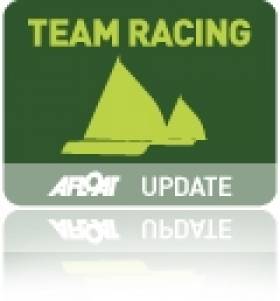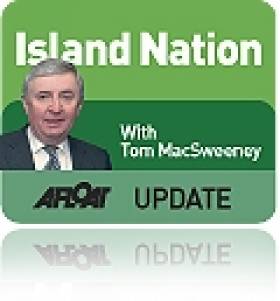Displaying items by tag: David Harte
#youth sailing – David Harte of Schull Community College Sailing Club offers his views on how one secondary school in West Cork is contributing to youth sailing and the Irish dinghy scene.
I have taken on board, with interest, many of the recent letters, forums, and discussions on the present state of dinghy racing in Ireland. Whilst generating much food for thought, I would like to avail of the opportunity to mention the very positive input, that a small secondary school situated in the far south-west, contributes to the overall status of dinghy sailing, and, racing, in Ireland.
Schull Community College has 450 enrolled students, 98% of which, would come from a non-sailing background,. The College Sailing Club has 78 members. Introduction to sailing takes place in September when all 1st year students are afforded an opportunity to experience sailing. This would take the form of a fun day out with the goal that all students come back with a smile. Those interested in learning the skills, to whatever level or standard, are invited to become members of the Schull Community College Sailing Club.
The cost for membership is €100 for the year, or €150, for two, or more, family members. This fee covers Saturday sailing throughout the year (weather permitting), with instructors and coaches, and the use of a variety of dinghies to suit all skills.
Beginners are thought the skills of sailing without reference to the SBSS (ISA Small Boat Sailing Scheme). We intentionally do not use this scheme as we have found in the past, that students prioritise attainment of levels over skills.
The goals of each student are different, with some content to sail back and forth with their friends having fun, but using the proper skills to do so, while others are eager to advance to developing Team Racing skills. Progress to this stage can be achieved once the student has demonstrated a good understanding of the 5E's, and can sail around a course with little or no rudder. Saturday sailing, during the year, attracts an average of 30 sailors on a cold day to 50+ on a sunny day Team racing discipline is used at the school as it is an achievable goal with little or no personal resources required, with boats and coach supplied by the FMOEC.
"We intentionally do not use the ISA Small Boat Sailing Scheme as we have found in the past, that students prioritise attainment of levels over skills".
Students learn the advanced skills of sailing, an introduction to racing rules, and team work. A typical Saturday would involve, briefing, boat handling exercises, team racing, and de-briefing, as well as boat maintenance, and seamanship skills, etc. With team racing, students upskill rapidly, as competition for team places is continuous throughout the year. Most of the students would never have sailed outside of Schull Harbour, but, within a few years, clearly demonstrate a skill level, equal to, or above their peers from other clubs. When students reach transition year they have an extra days sailing on Wednesdays. At this stage students are divided into two groups, with one group learning to sail and the other learning the skills required to become a Dinghy Instructor. For instructorship, students attend VHF, First Aid, and Powerboat courses, and their pre-entry. At this stage, none of the students would have any SBSS levels, but, they would have the skills necessary to pass their pre-entry Most of these courses are subsidised by the FMOEC which allows the student to become an Instructor, without the burden of recourse to personal resources. Mainstream costs to fulfill all courses required to become an Instructor approximate in the region of €1,500, which, in my view, is completely ridiculous.
Most of the students who become instructors, are offered summer jobs at the centre, teaching the SBSS to the general public. Our courses run for nine weeks, and it is during this that our instructors see the downfall of the SBSS, with a sizeable percentage of students attending the courses showing more interest in the cert., rather than the skill. This in turn forces sailing clubs and centres to issue certs., as parents believe they have paid for the cert., and not the skills. Our team racing teams participate in many events throughout the year, ranging from the Munster Schools Team Racing Championships to the International Wilson Trophy.
A look at the results from last years 1st team, which consisted of six team members, of which, five came from a non-sailing background, demonstrates the achievement of the FMOEC syllabus. Irish National Champions, British U21 Champions British Schools Champions, Youth Helmsman Champion, Silver Senior Helmsman Championships, 4.7 National Champion and Silver Radial Championships. It would be easy to ascribe this success to 'an exceptional team', but, Schull teams have been Irish National Champions every year, except two, have won the British Schools Championships four times, and been in the top four over the last six years.
One may pose the question....'where do they go after they finish at Schull Community College, and, do they continue sailing?..... Follow up on team-racing participants, whether they go on to 3rd. level, or, otherwise, demonstrates a continuing healthy involvement in sailing activities. In 2011 the ITRA (Irish Team Racing Championships) were held in Schull and over 50% of the helms entered in the event were ex-Schull Community College.
In conclusion, it is my belief that the present state of dinghy racing in Schull (Ireland) is strong, and, demonstrably, getting stronger.
More on this subject of dinghy sailing here
Preparations Underway for Team Racing Worlds
With the advent of 2011, preparations are now well under way for the holding of the ISAF World Team Racing Championships at Schull from August 27th, 2011 to September 23rd, 2011 writes Claire Bateman. It is a major triumph for the village of Schull, Co. Cork to host the World Championships. The organising committee on behalf of the Fastnet Marine and Outdoor Education Centre (FMOEC) was set up in 1997 and is an adjunct of Schull Community College and the facilities function under the auspices of the Cork County Educational Committee. As Schull is a village community this event will be seen as a community undertaking and the Schull Development Association will be a co-operating organising authority.
The event will be sailed in TR3.6 dinghies which are not too dissimilar to a firefly and 26 boats will be built locally at a cost of €5000.00 each. The hulls will be manufactured in Midleton and the sails will be built by the local sailmaker, Fastnet Sails, in West Cork. So far twelve boats have been sponsored. One of these has been sponsored by Schull Harbour Sailing Club where members have come up with a novel idea to sponsor a second boat. This is a one hundred club where members and their friends each contribute €50.00 towards the project.
Team Racing is a very popular branch of sailing where everything happens very quickly and there is no better school for tactical decision making and understanding of the rules with six boats at a time performing an intricate and aggressive dance where two teams of three race to try and achieve a winning combination of places – with the lowest score winning.
ISAF wish to invite 28 teams to participate at the event in August with teams coning from as far away as Australia, New Zealand and the U.S. with the host country having three teams. Teams are also expected from Italy, Japan, Poland, the U.K. France and Croatia.
Further information or queries regarding sponsorship for this exciting World Championship can obtained from Mr. Tim O'Connor, Principal, Schull Community College at [email protected] or Mr. David Harte, Manager, FMOEC at [email protected].
Schull is a unique part of Ireland for sailing and socialising. The scenery is breath taking, the sailing waters are magnificent, the reputation for organisation of major events is second to none and all our good wishes for the successful running of this major undertaking are with the organisers.
David Harte Sets Another Headline
I have long admired the commitment and dedication to sailing of David Harte in Schull. With his design of the TR 3.6 he has achieved what may well prove to be the ideal boat for team racing. This aspect of sailing is proving very popular amongst younger sailors. In the past few months I have been watching and reporting on the development of the sport by Match Racing Ireland which is now an integral part of the Irish Sailing Association. There is an excitement and enthusiasm which is good for the sport.
Now Schull and David Harte are adding a new dimension with the TR 3.6 which seems a bit like a Firefly when you look at it first, but then there are clear differences in design. The 3.6, a two-person dinghy, is just that in length. "It is robust, cheap to produce and the first boat customised for team racing. This is a boat for people who don't own a boat. It is a boat made for a situation where different crews will be using it and it has to be able to stand up to that pressure. I looked at the concept of the Firefly and then adapted it to what will prove to be a good boat for team racing," David told me.
The boat was shown for the first time at the announcement that Schull will host the ISAF Team Racing World Championships which will be held in the West Cork harbour in 2011. Twenty-four teams from around the world will compete, with the Fastnet Outdoor Education Centre as the base. It has a proven record of success in teaching sailing as a curricular subject at the adjacent Schull Community College which, through the foresight of the Cork County Vocational Education Committee, established this approach several years ago.
David Harte manages the operation. The success of the Schull students in winning the British championships this year, as well as their progress in the sport elsewhere after they leave the college is a testimony to his success.
Next weekend the Irish Team Racing Championships will be held in Schull, with 18 teams from around the country competing "and 40 per cent of the helms will come from Schull," David told me with a satisfied smile, which he deserves to have.
It is intended to raise funding for a fleet of 25 new TR 3.6 boats which Schull will provide for the world championships. Afterwards the boats will remain there, providing more years of sailing for young people. A sponsorship project has been launched and already seven boats have been funded. It is intended to build the boats in Cork and to have the sails made there. The world championships are scheduled to start on Saturday, August 27, 2011.
Photos of the new design afloat HERE
• This article is reprinted by permission of the EVENING ECHO newspaper, Cork, where Tom MacSweeney writes maritime columns twice weekly. Evening Echo website: www.eecho.ie






























































